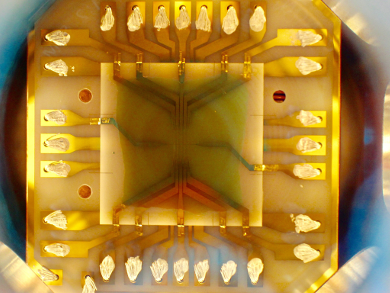The MAIUS 1 (Matter-Wave Interferometry in Microgravity) experiment was launched in January 2016 on board a sounding rocket from the Esrange Space Center near Kiruna, Sweden. During the approximately six-minute microgravity phase of the flight, Stephan Seidel, University of Hannover, together with scientists from ten other German research facilities succeeded in producing a Bose-Einstein condensate (BEC) in space for the first time and performing atom interferometry experiments with them. Bose-Einstein condensates are produced when a gas is cooled down to close to absolute zero.
Over a few years, the team miniaturized the technology to fit into the 2.5 x 0.5 m payload module of a sounding rocket. To produce a Bose-Einstein condensate, a cloud of atoms – here rubidium – must be cooled down to almost –273 °C. Beams of tiny lasers slow down the rubidium atoms. The particles are then loaded into an atomic trap. It is created by an atom chip on which magnetic fields are generated. Then the temperature in the magnetic trap is reduced. This reduces the magnetic field, so that the height of the ‘ trap walls’ is reduced. Consequently, only the coldest and hence most motionless particles remain in the trap. These ultra-cold atoms were used for matter-wave interferometry.
Two further missions will follow in 2018 and 2019. On MAIUS 2, in addition to ultra-pure rubidium atoms, ultra-cold potassium atoms will be used on a sounding rocket. With MAIUS 3, the falling velocity of Bose-Einstein condensates from both atomic species will be compared via interferometry to test the equivalence principle, which lies at the heart of Einstein’s General Theory of Relativity. The long term aim is to be able to use the technology on satellites or the International Space Station (ISS).
- MAIUS 1 – First Bose-Einstein condensate generated in space,
DLR 2017. - A compact and robust diode laser system for atom interferometry on a sounding rocket,
V. Schkolnik, O. Hellmig, A. Wenzlawski, J. GrosseA. Kohfeldt, K. Döringshoff, A. Wicht, P. Windpassinger, K. Sengstock, C. Braxmaier, M. Krutzik, A. Peters,
Appl. Phys. B 2016, 122:217.
DOI: 10.1007/s00340-016-6490-0 - Atom Interferometry on Sounding Rockets with Bose-Einstein Condensates,
Stephan T. Seidel, Dennis Becker, Maike D. Lachmann, Waldemar Herr, Ernst M. Rasel,
APS Division of Atomic and Molecular Physics Meeting 2016, abstract #N5.006.
2016APS..DMP.N5006S




